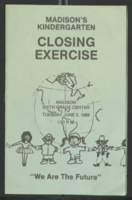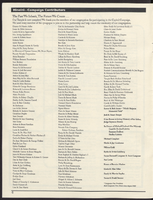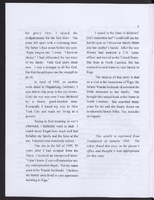Search the Special Collections and Archives Portal
Search Results

Mabel Hoggard: community interest materials (folder 2 of 3)
Date
Archival Collection
Description
Folder of materials from the Mabel Hoggard Papers (MS-00565) -- Personal papers file. This folder contains event programs, "Going For The Gold: The Story of Black Women in Sports" booklet by Ken Bently (a gift to J. David & Mabel W. Hoggard, not digitized in its entirety), "Pictorial Souvenir Book of the Pennsylvania State Federation of Women's Clubs, Inc." (not digitized in its entirety), and Alpha Kappa Alpha Sorority Theta Theta Omega Chapter 1988 "BLAC-tivities" calendar.
Mixed Content
Beverly Rogers Collection of Armed Services Editions
Identifier
Abstract
The Beverly Rogers Collection of Armed Services Editions includes one thousand two hundred and seventy-nine of the original paperback Armed Services Edition titles published between 1943 and 1947 used by World War II service members in the United States Army and Navy, as well as four editions from the Legacy Project published in 2003 and one from the Pocket Books Inc. series published in 1944. The original Armed Services Editions include works of fiction and non-fiction in their unabridged forms.
Archival Collection

Transcript of interview with Darrin Bush by Claytee White, June 30, 2016
Date
Archival Collection
Description
In 1948 in Las Vegas, Nevada, a camera-girl-turned-cocktail-waitress and a casino credit manager welcomed the birth of their son, Darrin Bush. After attaining his education at St. Joseph’s Catholic School and Bishop Gorman High School, Bush earned his Bachelor’s degree in journalism at the University of Nevada, Reno. Bush credits his love for photography to his mother’s influence and his study of journalism. Bush’s first job after college as a room service waiter at the Sahara Hotel eventually grew into the coveted position of room service swing captain. His swing shift duties included the entertainers' dressing rooms, which meant taking care of the entertainers, getting them what they needed, and stocking their favorite foods and drinks nightly. Through his work, Bush eventually formed close friendships with several celebrities of the day. He enjoyed his work, but he never stopped honing his skills as an amateur photographer. In the mid-1980s, Bush left the Strip to become a professional photographer for the Las Vegas News Bureau. Throughout his News Bureau career, Bush photographed the casino buildings made famous by Las Vegas-the construction and the architecture of Southern Nevada’s gaming palaces-as well as iconic events in Las Vegas history. Darrin retired from the News Bureau in about 2014, but his work recording the building of and events of Las Vegas lives on in the News Bureau archives. He continues to be an avid photographer.
Text

Transcript of interview with Tony Scodwell by Lisa Gioia-Acres, September 29, 2008
Date
Archival Collection
Description
Tony was born the only son of the only son in Beloit, Wisconsin. Following his parents divorce when he was 12, he and his father went to live with his grandparents who, he admits, spoiled him. While neither of his parents played a musical instrument, Tony’s grandmother was a professional organist. In addition, Tony had an uncle who was a professional saxophone player and who was an inspiration to him. Tony’s dad was very supportive of his decision to learn trumpet and rented Tony an instrument, took him to his lessens, and sat with him while he practiced. Tony was firm in his convictions by the 9th grade that he was going to be a musician. Following high school, Tony was awarded a full scholarship to the Berklee School of Music in Boston which was a very prestigious music school. Tony repeatedly left school to go on the road which the school fully expected of their students. The last time he left the school he never went back. Tony states he got his degree on the road with experience from playing in bands like Stan Kenton, Tommy Dorsey, and with his idol Harry James. Tony took his career abroad when he took up residence in Cologne, Germany to play with a band there. Tony came to Las Vegas to play in a band with Buddy Rich which turned out to be of a shorter duration than he expected. Tony then played in Las Vegas and Reno for a time before going back on the road after realizing he preferred playing jazz on the road as opposed to playing in show bands. After eight years on the road, Tony returned to Las Vegas, got married, and settled down. Aptitude tests proved accurate when they showed Tony had a talent for things mechanical and metal as Tony went on to manufacture trumpets in addition to playing them. One can feel the love Tony has for his trumpets as he describes the process of creating them. After playing trumpet for almost 30 years, Tony decided it was time to concentrate on his photography for a while. Tony does not consider himself retired, but rather he likes to play, take pictures, and, of course, he practices the trumpet every day.
Text

Transcript of interview with Jack Cornell by Richard Fesler, February 18, 1979
Date
Archival Collection
Description
On February 18, 1979, Richard Fesler interviewed Jack W. Cornell (born 1918 in Manhattan, Nevada) about his experiences living in Nevada. The two first discuss historical buildings, including the Nye County Courthouse, and Cornell describes his family background and the different locations at which his ancestors lived. Cornell then talks about his experiences as an airplane mechanic for the Army Air Corps during World War II and the different countries he would visit during that time. The two also discuss the effects of the Depression, Cornell’s work in automotive body repair, and his recreational activities. Cornell also describes an experience in which he assisted an air escort for President Roosevelt, and he also describes when he witnessed one of the atomic tests. The interview concludes with Cornell’s thoughts on how the rural area in Manhattan has changed over time.
Text

Transcript of interview with Steve Riback by Barbara Tabach, December 12, 2017
Date
Archival Collection
Description
Sgt. Steve Riback is a Detective Sergeant for the Las Vegas Metropolitan Police Department. He has been with the police force for nearly twenty years. On the night of the Route 91 Harvest festival shooting, he had just returned home shortly after 10pm. He had been on an overtime assignment at the Golden Knights hockey game at the T-Mobile prior to the shooting. When he was abruptly awaken by a call from his lieutenant, he was oblivious to the time and immediately rushed into action—contacted his squad members and sped to his station in northwest part of the city. He reflects on his overwhelming pride of the police that day, recalling what he heard on his police radio, seeing the rush of police cars being dispatched, and watching a body camera video later. Sgt. Riback’s squad was assigned to Spring Valley Hospital where they worked tirelessly to identify victims, both injured and deceased. His reflections stir the image of medical professionals and police officers urgently fusing together to handle the situation at hand. Riback shares a myriad of emotions, talks about the options available for officers to deal with their personal trauma, and how he explained to his eight-year-old why Daddy was crying. Riback is also known as the Kosher Cop and has authored a book, My Journey Home, about becoming an observant Orthodox Jewish officer and his struggle for the right to wear his beard and a yarmulke while on duty.
Text

Transcript of interview with Kenny Epstein by Barbara Tabach, May 1, 2015
Date
Archival Collection
Description
On a pleasant spring evening at sundown in April 2017, a Pop-Up Shabbat draws a crowd of Jews to the Jackie Gaughan Parkway at the El Cortez Hotel & Casino. Proudly, and quietly, watching from the sideline is Kenny Epstein, owner of the El Cortez. He seeks no recognition, but is enjoying the gathering for Sabbath services and the music that will fill the air. Kenny Epstein is also a classic enthusiast of Las Vegas history. The nostalgia is evident as one walks through the casino and reinforced by the stories of a man who has experienced the city’s growth since moving here in 1959 at the age of 18. The timeline of Kenny’s teen years begins with his bar mitzvah in Chicago and a story of prizefighter Rocky Marciano giving a brief toast. When he was 15, his parents, Ike and Adele Epstein, took the family to visit Las Vegas. About three years later, his father became an executive at the Stardust. Kenny’s own imprint on Las Vegas history was just beginning. In this brief interview, he mentions an illustrious list of mentors and recalls many historic moments from the history of the Las Vegas Strip. All of which led to his ownership of The El Cortez—advertised as the longest continuously operating hotel/casino.
Text


